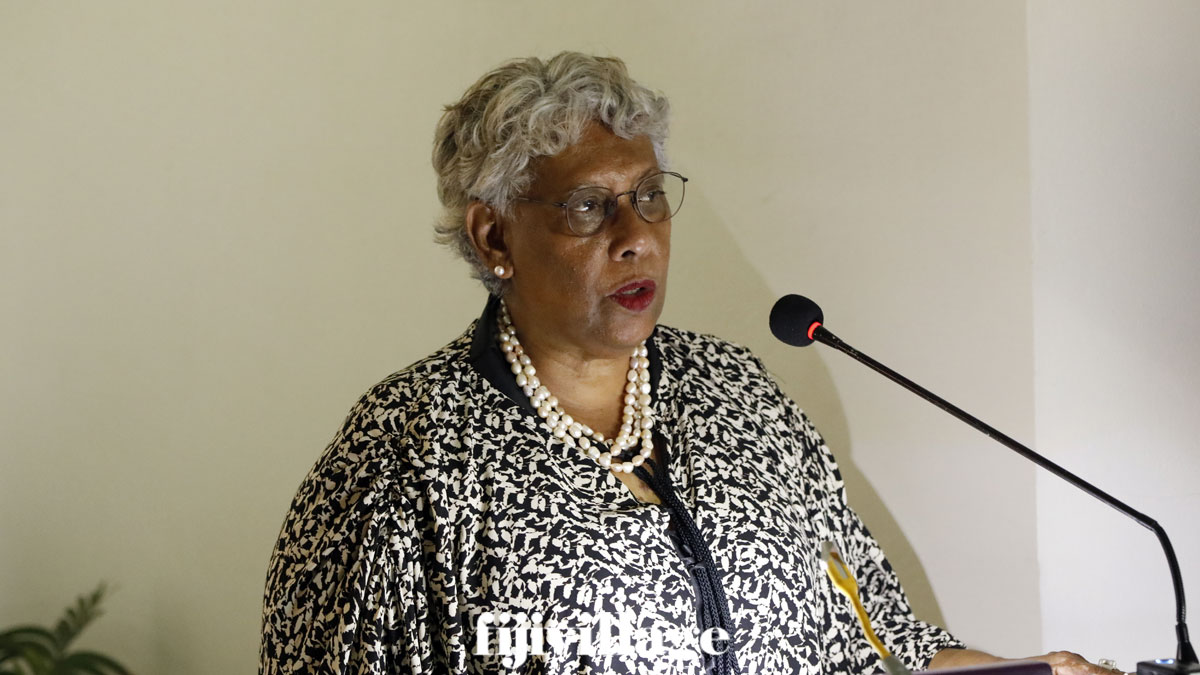
The Vice Chancellor of the University of Fiji, Professor Shaista Shameem has expressed her dismay at the way in which the budget consultations for educational funding ended on Friday.
She says a recording of a tit-for-tat squabble involving the Vice Chancellor of the University of the South Pacific, Professor Pal Ahluwalia and the Chair of the Pacific Polytech, Dr Ganesh Chand, has since gone viral on social media as well as the mainstream news.
Professor Shameem says while the heated exchange in public by the two can be dismissed as a 'boys will be boys spat', nevertheless, it showed the confusion between the words, 'higher education', and 'further education' which opened up a can of worms.
She says it starkly revealed how bewildering the post-secondary landscape had become for providers of normal university education such as the University of Fiji.
She further says the Higher Education Commission Act, in its review provision, section 9, states that a review committee, referred to recently by the Minister of Education in the media as an ‘external review committee’, is to be established by the Higher Education Commission to review existing and new higher educational institutions.
Professor Shameem asked if Pacific Polytech is not considered to be a 'higher' educational institution, but only a ‘further’ educational institution, as was said at the budget consultations, does this mean it won't be reviewed?'.
The Uni Fiji Vice-Chancellor say if so, that won't be fair.
She adds no provider of post- secondary education can slip out of a justifiable review of how taxpayers funds are being spent by calling itself a 'further educational provider' or some such sleight of hand to avoid legislative review of its performance.
Professor Shameem says in her opinion, institutions such as Pacific Polytech needed to be reviewed regularly for transparency as there was no reason for them to be exempt from review.
She also says that the Higher Education Commission of Fiji (HECF) itself needed to be looked into again by the Minister of Education as those appointed to the Commission must have the necessary qualifications mandated by the Act.
For example, section 6 of the Higher Education Commission Act says the Chairperson and members of the Commission shall have significant qualifications and experience in higher education, giving an extensive range of what those should be.
She says however, some of those who have been appointed to the Commission fall far short of these mandatory qualification and experience provisions.
She adds the result of such shortfall in qualifications and experience is the debacle that was announced by the Minister of Education recently on the outcome of the review of the three universities conducted by the Higher Education External Review Committee (ERC).
The Vice-Chancellor says they were informed only by the media that there will now be an 'audit' of the External Review Committee's report of the three universities because of allegations of integrity in the External Review Committee.
She says however, the Higher Education Commission did not inform the University of Fiji that there were 'allegations of integrity' in the External Review Committee's membership, or what they were, and UniFiji was shocked by this lack of communication by the Commission.
Professor Shameem says they have been requesting for months to Higher Education Commission of Fiji to provide them with the External Review Committee's review report in order to proceed with their plans for 2025, however, there are so many excuses for the delay, ever since November last year and they are getting fed up.
She says the University's Strategic Plan 2022-2026 outputs were being affected by the apparent lack of competence on the part of the Commission due to its shortfall in qualifications and experience in higher education.
Professor Shameem says she had paused the development of new programmes at the University until the review report was disclosed for its right of response and this seriously hindered the work of the University.
She also says they are now informed, through the media, that the report will go here, there and everywhere, without them having that right of response first.
The Vice Chancellor says if there are allegations of lack of integrity of the External Review Committee then UniFiji definitely needs a right of response first before the reports go public.
Professor Shameem also referred to the Minister's intention to appoint a consultant to 'audit' the External Review Committee's three university review reports.
She says that nothing in the Higher Education Commission Act gives any powers to audit an External Review Committee's review report.
She further says such audit would be grounds for the 'reviewed' higher educational institutions calling into question the qualifications of a number of the External Review Committee members and how they were appointed.
Section 37 (2) of the Higher Education Commission Regulations 2009 makes higher the qualifications and experience of the External Review Committee membership mandatory for appointment.
Professor Shameem says that, nevertheless, the University of Fiji had a really good experience with the External Review Committee members who visited the University of Fiji to review it.
She says the University was informed unofficially after the months-long review that its performance, especially its human values approach involving the Gurukul and Drua branding in educational delivery, was exemplary despite the insufficiency of funding under the current funding model of the universities.
She further says the University of Fiji also was internationally accredited under the UK Quality Assurance Agency's European Standards and Guidelines after a 2-year period of rigorous review by international bodies, hence UniFiji was way ahead of its targets in quality education globally.
She says that while the Higher Education Commission's External Review Committee review was awaited by UniFiji with some interest, nevertheless it was better for the University to look to international standards when assessing its own performance as an authentic higher education provider.
She says this was to ensure it was using taxpayers’ money wisely to provide top quality education, especially when the composition of HECF and its external committees was in doubt.
Given such Higher Education Commission problematique, Professor Shameem says the University of Fiji Council had called on the Minister of Education to firmly take full responsibility for higher education directly under his Ministry as a holding mechanism while membership of HECF was properly constituted according to its Act.
She says appointments made ultra vires the Act was one of the causes of the embarrassing spat between the heads of two post-secondary institutions as witnessed by the public at budget consultations held on Friday by the Minister of Finance.
The Vice-Chancellor says when there is confusion between the definitions of 'higher' education and 'further' education, that even the Minister of Finance stated he could not understand, it's time for the Minister of Education to take decisive action after obtaining good legal advice from the Attorney General’s Office, to safeguard taxpayers' funds for higher education and treat all higher institutions fairly.
Stay tuned for the latest news on our radio stations

